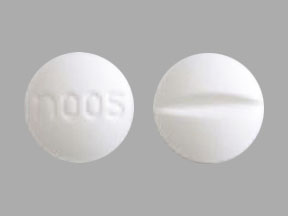Oxybutynin Patient Tips
Medically reviewed by Carmen Pope, BPharm. Last updated on July 26, 2024.
1. How it works
- Oxybutynin may be used to treat symptoms of bladder instability.
- Oxybutynin works by relaxing the smooth muscle in the bladder wall. This increases the urine-holding capacity of the bladder, decreases bladder contractions, and delays the initial desire to empty the bladder. Oxybutynin does this by blocking the release of acetylcholine, a chemical transmitter responsible for muscle contraction within the bladder.
- Oxybutynin belongs to the class of medicines known as anticholinergics (also known as antimuscarinics).
2. Upsides
- Oxybutynin decreases both the urgency and frequency of urination.
- Helps with bladder control in people with an overactive bladder, urinary incontinence, or urinary leakage.
- Helps regulate urinary frequency, urgency, urinary leakage, urge incontinence, and dysuria (pain associated with urination).
- Available as an immediate-release tablet, an extended-release tablet, an oral solution, a transdermal patch, and a transdermal gel.
- Generic oxybutynin is available.
3. Downsides
If you are between the ages of 18 and 60, take no other medication or have no other medical conditions, side effects you are more likely to experience include:
- Dry mouth, constipation, thirst, abdominal pain, nausea, or little or no urination. May also cause blurred vision and affect your ability to drive or operate machinery.
- Seek immediate medical advice if side effects such as hallucinations, agitation, confusion, or sleepiness occur, particularly in the first few months of treatment or after a dosage increase.
- Not suitable for people with or at risk of urinary retention, severe decreased gastrointestinal motility conditions, or uncontrolled narrow-angle glaucoma. Also not recommended for people with heart disease, dementia, liver or kidney disease, an enlarged prostate, myasthenia gravis, inflammatory bowel disorders, GERD, or frail, elderly people.
- Rarely, may cause angioedema (a skin reaction characterized by swelling of the face, lips, tongue, or throat). In some cases, this occurred after the first dose. Seek urgent medical help if these symptoms or breathing difficulties occur.
- Can decrease perspiration and increase the risk of developing heat stroke. Avoid overheating or becoming dehydrated in hot weather or during exercise.
- May interact with several other drugs including ketoconazole, itraconazole, and erythromycin.
- May also alter the absorption of other medications taken at the same time due to its effects on gastrointestinal motility.
Note: In general, seniors or children, people with certain medical conditions (such as liver or kidney problems, heart disease, diabetes, seizures) or people who take other medications are more at risk of developing a wider range of side effects. View complete list of side effects
4. Bottom Line
- Oxybutynin helps to relieve symptoms of an overactive bladder and urinary incontinence but it may cause side effects such as a dry mouth and constipation.
5. Tips
- Oxybutynin may be taken with or without food. Take it with a glass of water.
- Take exactly as directed by your doctor. Do not take more or less than recommended.
- Do not crush, chew, or break an extended-release tablet. Swallow it whole.
- Oxybutynin patches should be applied to dry, intact skin on the abdomen, hip, or buttock, twice weekly (every three to four days). Avoid consecutive reapplication to the same site.
- Seek immediate medical attention if you notice any swelling of your lips, tongue, or throat or have difficulty breathing.
- Be careful not to become dehydrated during hot weather while taking oxybutynin as heat stroke can occur.
- Be aware that alcohol can enhance the sedative effect of oxybutynin.
- Your vision may become blurred with oxybutynin and affect your ability to drive.
- Seek urgent medical attention if you develop hot and dry skin, extreme thirst, constipation, or severe stomach pain; or pain, burning, or difficulty with urination.
6. Response and effectiveness
- Peak concentrations are reached within half to one hour. The effects of immediate-release oxybutynin tablets are relatively short-lived but may last up to eight hours.
- Immediate-release oxybutynin is usually taken three to four times daily unless it is just used for night-time urinary incontinence when one dose is taken at night. An extended-release tablet (Ditropan XL) and a patch that is placed on the skin (Oxytrol) are also available.
7. Interactions
Medicines that interact with oxybutynin may either decrease its effect, affect how long it works, increase side effects, or have less of an effect when taken with oxybutynin. An interaction between two medications does not always mean that you must stop taking one of the medications; however, sometimes it does. Speak to your doctor about how drug interactions should be managed.
Common medications that may interact with oxybutynin include:
- antihistamines such as diphenhydramine or doxylamine
- botulinum toxin
- glucagon
- other medications that have anticholinergic properties
- potassium supplements
- pramlintide
- some medications used to treat mental illness, such as clozapine and chlorpromazine
- medications that are strong inhibitors of CYP3A4
- opioids, such as oxycodone or morphine
- thiazide diuretics.
Note that this list is not all-inclusive and includes only common medications that may interact with oxybutynin. You should refer to the prescribing information for oxybutynin for a complete list of interactions.
Related/similar drugs
More about oxybutynin
- Check interactions
- Compare alternatives
- Pricing & coupons
- Reviews (462)
- Drug images
- Side effects
- Dosage information
- During pregnancy
- Support group
- Drug class: urinary antispasmodics
Patient resources
Other brands
Ditropan, Ditropan XL, Oxytrol, Gelnique, Anturol
Professional resources
Other brands
Ditropan, Ditropan XL, Oxytrol, Gelnique
Related treatment guides
References
- Oxybutynin. Revised: 09/2022. AvKARE. https://www.drugs.com/pro/oxybutynin.html
Further information
Remember, keep this and all other medicines out of the reach of children, never share your medicines with others, and use oxybutynin only for the indication prescribed.
Always consult your healthcare provider to ensure the information displayed on this page applies to your personal circumstances.
Copyright 1996-2025 Drugs.com. Revision date: July 26, 2024.

